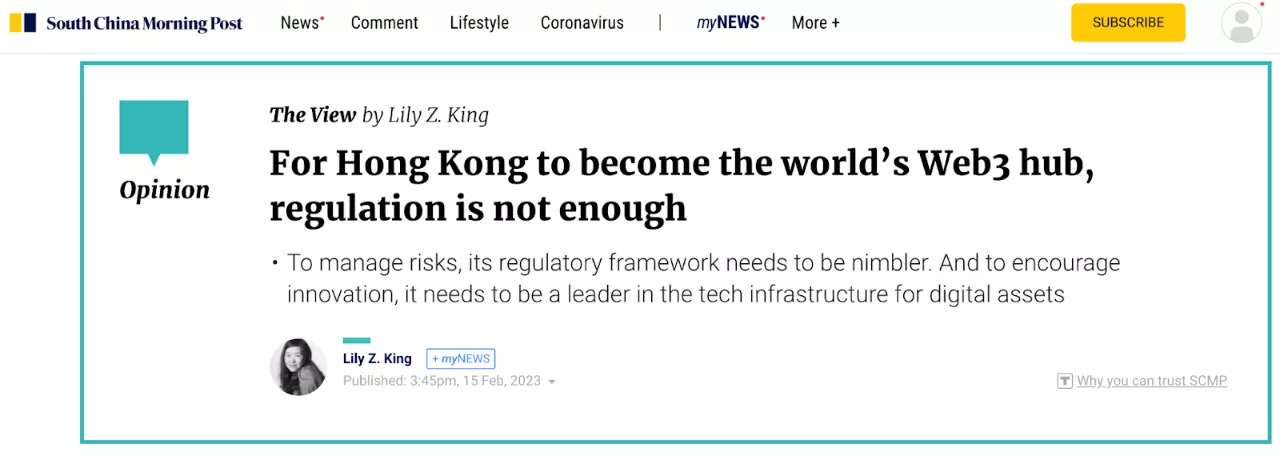Cobo: To become a global Web3 center, Hong Kong's supervision is not enough
Original Author: Lily Z. King, Cobo COO
Editor's note: The South China Morning Post website published an article by Cobo COO Lily Z. King on February 15, discussing Hong Kong's advantages and current environment in the cryptocurrency industry, and how Hong Kong can become a global Web3 center.

Hong Kong’s regulatory framework needs to be more flexible to manage risks, and to incentivize innovation, Hong Kong needs to be a leader in digital asset technology infrastructure.
The Hong Kong Monetary Authority recently released a document on the regulation of stablecoin-related activities. This is in line with Hong Kong's strategy to connect next-generation digital assets with its well-established traditional financial ecosystem, a core strength of Hong Kong's role as a Web3 hub. Hong Kong has made steady progress in establishing a clear and comprehensive framework, and the regulation of stablecoins is no surprise.
However, being a well-regulated global financial center is not enough to give Hong Kong a sustainable advantage over other potential centers such as Silicon Valley, Dubai and Singapore. Hong Kong also needs to become a leader in the digital infrastructure that supports the creation and trading of digital assets, thereby attracting the best builders in the industry.
Hong Kong, once home to many well-known cryptocurrency exchanges, still has more Bitcoin ATMs than any other Asian city. However, at the beginning of 2019, due to the epidemic and cautious policies, Hong Kong's position in the global cryptocurrency industry has declined.
Missing out on the wild booms and busts of the cryptocurrency industry might not be such a bad thing. Founded in Hong Kong and later relocated to the Bahamas, FTX eventually unleashed a multibillion-dollar financial disaster that brought down the entire cryptocurrency industry. Cryptocurrency mining companies that opted to list on Nasdaq instead of the Hong Kong stock exchange are now mostly struggling financially and have come under heavy criticism for their negative impact on the environment.
The cryptocurrency industry has entered reset mode, and this gives Hong Kong a great opportunity to redefine how a Web3 hub should behave.
This year, we have seen more signs that the Chinese government views blockchain and digital assets as a potential source of economic growth. Hong Kong has gained support to explore a path of innovation and global integration unrestricted by mainland policies. Meanwhile, the U.S. and Europe are tightening their cryptocurrency regulations in the wake of the FTX and Genesis debacles. That could shift more activity around digital assets east — and a good time for Hong Kong to regain its influence.
As one of the most powerful capital markets in the world, Hong Kong's sound financial regulatory framework and top financial and technical talents are its significant advantages. With its mature capital market, Hong Kong's digital asset industry is also a unique combination of technology and finance. This makes it an ideal place to create real-world blockchain applications, especially when it comes to asset tokenization.
The Hong Kong government aims to create an enabling environment for public-private collaboration. When government agencies, financial institutions, tech giants, and crypto-native builders work together, digital assets have the potential to better integrate into real-world economies and have impact beyond the virtual world.
Hong Kong can also leverage technology entrepreneurs in mainland China. Chinese Internet companies, which have created Web2 products comparable to leading Western companies, still have a lot of expertise related to digital assets and Web3. Hong Kong-listed Chinese Web2 giants such as Tencent, Alibaba, Bilibili and Baidu are already testing the waters of digital assets. Hong Kong may be just the hotbed they need.
However, Hong Kong also faces challenges in becoming a Web3 hub. One is that the existing regulatory framework designed for traditional assets may not be suitable for rapidly developing digital assets and cutting-edge technologies.
The principle of "same business, same risk, and same rules" for digital asset regulation in Hong Kong means that traditional financial regulation is also applicable to digital assets. Just the high barriers to obtaining a license have made it a more favorable playing field for established institutions. Innovation often comes from an unpredictable “grassroots” level, so how to create space for bottom-up innovation is an urgent problem to be solved.
The security of digital assets is different from that of traditional assets. Their on-chain nature means that digital assets cannot rely on a closed security system like traditional finance. Licenses or regular audits cannot ensure the safety of client funds on a centralized platform. Advanced technologies like multi-party computation are needed to give asset owners full control or co-management of their assets.
The security of digital assets is different from that of traditional assets. Their on-chain nature means that digital assets cannot rely on a closed security system like traditional finance. Licenses or regular audits cannot ensure the safety of client funds on a centralized platform. Advanced technologies like multi-party computation are needed to give asset owners full control or co-management of their assets.
More importantly, in order to comply with new regulations, institutions also need solutions that can achieve distributed private key management and fund isolation. Custody, institutional wallets, and digital security are just some examples of the infrastructure required for a digital asset ecosystem.
More importantly, in order to comply with new regulations, institutions also need solutions that can achieve distributed private key management and fund isolation. Custody, institutional wallets, and digital security are just some examples of the infrastructure required for a digital asset ecosystem.
Original link



